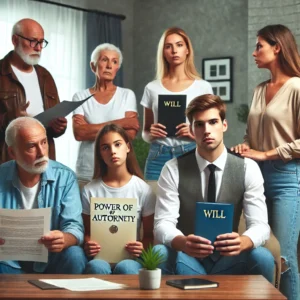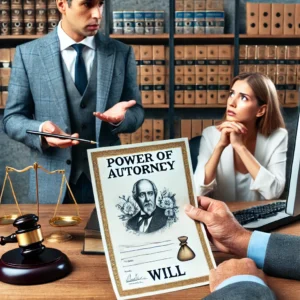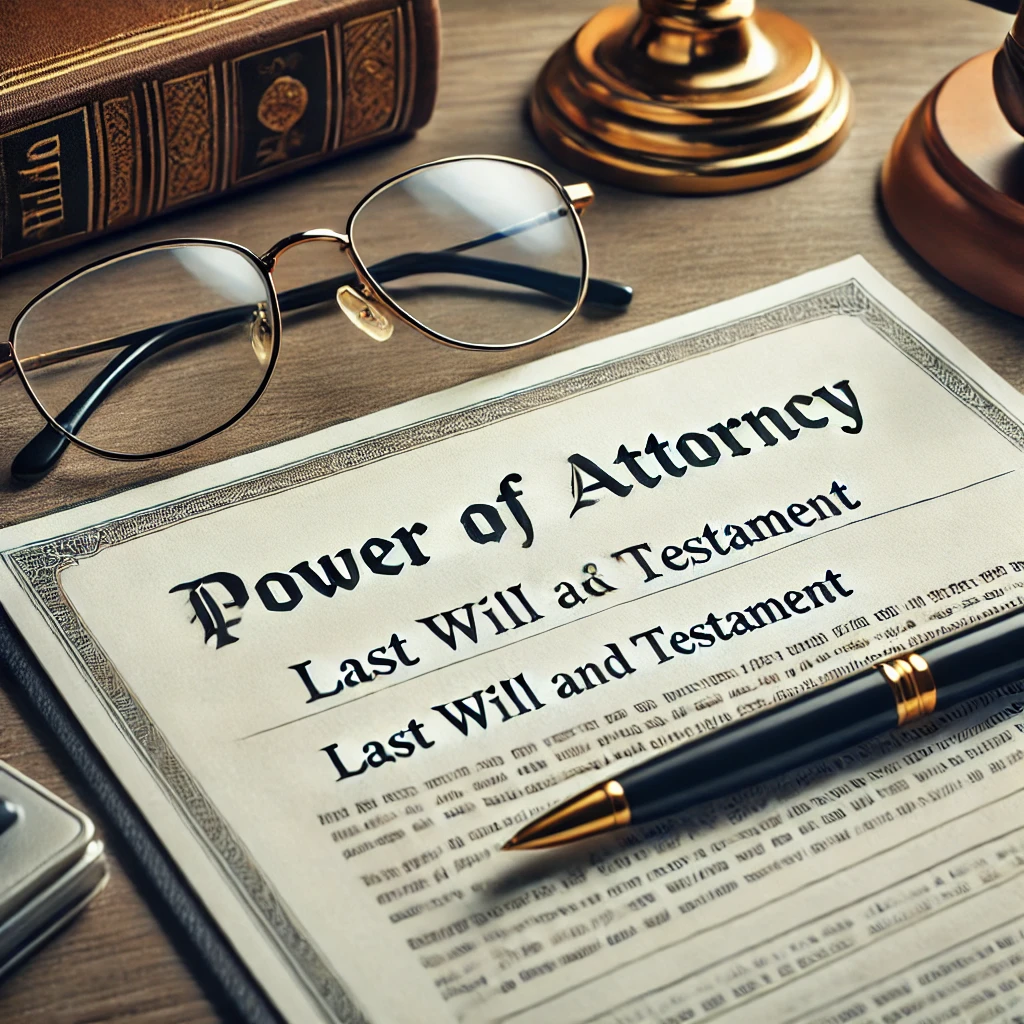The topic of whether a person with the power of attorney (POA) can change a will often leads to confusion among families. Understanding the legal boundaries of a POA and how it intersects with a person’s will is essential to avoid potential disputes.
This blog aims to explore the legal framework governing power of attorney and wills, emphasizing how the two differ and what role a POA holder plays when it comes to the will of the principal.
Understanding Power of Attorney (POA)
A power of attorney is a legal document that allows an individual to appoint another person to act on their behalf in legal and financial matters. This document gives the agent the authority to manage various tasks such as managing finances, signing documents, and making decisions about healthcare or property.
However, a POA is not a carte blanche to do anything with the principal’s property or legal affairs. The actions that the agent can undertake are strictly bound by the terms outlined in the POA document, and the principal’s intentions must always be respected.
What is a Will?

A will is a legal document that outlines how a person (testator) wants their assets and estate to be distributed after their death. It details beneficiaries, guardians for minor children, and executors responsible for carrying out the testator’s wishes.
Unlike a POA, which is effective during the principal’s life, a will only comes into effect upon the death of the individual who created it. It cannot be altered after death unless it is found to be fraudulent or legally invalid by a court.
Can a POA Holder Change a Will?
The short answer is no, a person holding power of attorney cannot change a will. A power of attorney gives the agent authority to act in the principal’s best interests during their lifetime, but this authority does not extend to altering or revoking the will of the principal.
Why Can’t a POA Change a Will? A POA grants powers to manage financial or healthcare decisions while the principal is alive but does not permit the agent to alter documents that are intended to take effect upon the principal’s death.
A will is a personal document reflecting the specific wishes of the testator, and only the testator can modify or revoke it during their lifetime, provided they have the mental capacity to do so.
If an individual tries to change a will using a POA, this action is typically deemed invalid, and courts may intervene if necessary.
Key Differences Between a POA and a Will
It is crucial to differentiate between these two legal tools:
Timing: A POA is effective during the principal’s lifetime, while a will comes into effect after death.
Purpose: A POA is for managing affairs while the principal is incapacitated or unavailable, whereas a will designates how assets are handled after death.
Scope: A POA does not extend to estate planning decisions, especially altering a will, while a will directs estate distribution.
Types of POA and Their Limitations

There are different types of POAs, and each has specific limitations regarding the scope of authority:
General POA: Provides broad powers but still does not allow for changing a will.
Durable POA: Continues if the principal becomes incapacitated, but it does not extend after death.
Limited Power of Attorney: Grants specific powers for a defined and prescribed period or task.
Medical POA: Grants authority to make healthcare decisions but does not affect financial or estate decisions like a will.
Regardless of the type, none of these POAs can grant the agent authority to alter the principal’s will. Any will changes must be made directly by the testator.
Common Scenarios Leading to Confusion
Several scenarios can lead to confusion regarding the role of POA and the alteration of a will:
Dementia or Incapacity: If a principal is diagnosed with dementia or another condition affecting mental capacity, the POA might take over certain decisions.
However, the will cannot be altered even in such cases. Only the principal, if still mentally competent, can change the will.
Family Disputes: Family members may argue that the person with POA has authority to alter the will. It is important to clarify that while they can make financial decisions, they cannot modify the will.
How to Update a Will Legally
If a principal wants to update their will, the following steps must be taken:
Testamentary Capacity
The principal must have mental capacity to understand the changes they are making.
Creating a Codicil
A codicil is a legal amendment to the will that can make changes without having to create a new will from scratch. It must follow all the same legal formalities as the original will, including witnesses.
Revoking the Old Will
The principal can formally revoke the old will and draft a new one to reflect their wishes.
Consequences of Trying to Alter a Will Through a POA
If someone holding POA tries to change or interfere with the will, there could be significant legal consequences:
Court Challenges
Beneficiaries can challenge the validity of any changes made by the POA holder in court.
Criminal Charges
If there is evidence that the POA holder tried to alter the will fraudulently, they could face criminal charges for fraud or elder abuse.
Importance of Clear Estate Planning
To avoid confusion or disputes after a principal’s death, it is important to ensure that all legal documents, including POA and wills, are clearly written and legally sound.
Regularly updating estate plans with legal counsel ensures that both the POA and will reflect the principal’s current wishes.
Seeking Legal Help
Since estate planning and power of attorney laws vary by jurisdiction, it is advisable to seek the guidance of an attorney when drafting or updating these documents.
A lawyer can provide clarity on the scope of a POA and ensure that the principal’s wishes are respected.
Power of Attorney Format

Here is a general format for creating a Power of Attorney (POA) document. It’s advisable to consult with a legal professional to ensure compliance with your local laws and specific needs.
POWER OF ATTORNEY
KNOW ALL MEN BY THESE PRESENTS
I, [Your Full Name], son/daughter of [Parent’s Name], residing at [Your Full Address], do hereby appoint [Agent’s Full Name], son/daughter of [Agent’s Parent’s Name], residing at [Agent’s Full Address], to be my true and lawful attorney to act in my name and on my behalf for the following purposes and under the conditions stated below.
- Powers Granted
I hereby grant my attorney-in-fact the full power to manage, handle, and execute on my behalf the following:
Financial Matters: To operate and manage all bank accounts, sign checks, pay bills, and make investments.
Property Transactions: To buy, sell, lease, mortgage, and manage real estate and personal property.
Legal Matters: To represent me in any court or before any governmental authority and to sign legal documents.
Tax Matters: To file, sign, and submit tax returns on my behalf, handle audits, and make payments to tax authorities.
Healthcare Decisions (Optional): To make decisions about my medical treatment if I am incapacitated, including surgeries, treatment plans, and end-of-life care.
- Duration of Power of Attorney
This Power of Attorney shall remain in effect until:
I provide written notice of revocation, OR
(Select one):
(a) I become incapacitated, at which point this Power of Attorney shall be revoked (Non-Durable POA).
(b) This Power of Attorney shall remain in effect even if I become incapacitated (Durable POA).
- Limitations of Powers
My attorney-in-fact is NOT authorized to:
- Alter or revoke my Will
Transfer or sell assets without my consent (unless specified otherwise).
Make decisions related to personal relationships (e.g., marriage or adoption).
- Compensation
My attorney-in-fact shall serve (with/without) compensation for services provided under this Power of Attorney.
- Liability
My attorney-in-fact shall not be held liable for any decisions made in good faith on my behalf, provided they act within the powers granted hereunder.
- Revocation
I reserve the right to revoke this Power of Attorney at any time by providing written notice to my attorney-in-fact and any relevant parties.
- Signature and Witnesses
IN WITNESS WHEREOF, I have hereunto set my hand and seal this [Day] day of [Month, Year].
Signature of Principal: _________________________
Printed Name: ________________________________
Signature of Agent: ___________________________
Printed Name: _______________________________
- Witnesses
The undersigned hereby certify that we witnessed the execution of this Power of Attorney by the principal in their right mind and free from duress or undue influence.
Witness 1:
Name: ___________________
Signature: ___________________
Address: ___________________
Witness 2:
Name: ___________________
Signature: ___________________
Address: ___________________
- Notary Public
STATE OF [State]
COUNTY OF [County]
On this [Day] day of [Month, Year], before me, a Notary Public, personally appeared [Principal’s Name], who proved to me on the basis of satisfactory evidence to be the person whose name is subscribed to the foregoing instrument.
Notary Public Signature: _________________________
My Commission Expires: ______________________
This format serves as a starting point. You may customize sections based on your specific requirements and jurisdiction.
FAQs
√ Can a POA holder change the will?
No, a person with power of attorney cannot change a will.
√ Who can change a will?
Only the person who created the will (testator) can change or revoke it.
√ Can a POA make decisions after the principal’s death?
No, the power of attorney ends with the death of the principal.
√ Can a POA change beneficiaries?
No, a POA cannot alter the will’s beneficiaries or terms.
√ What should I do if I want to change my will?
You should contact an attorney to update your will or create a codicil.




